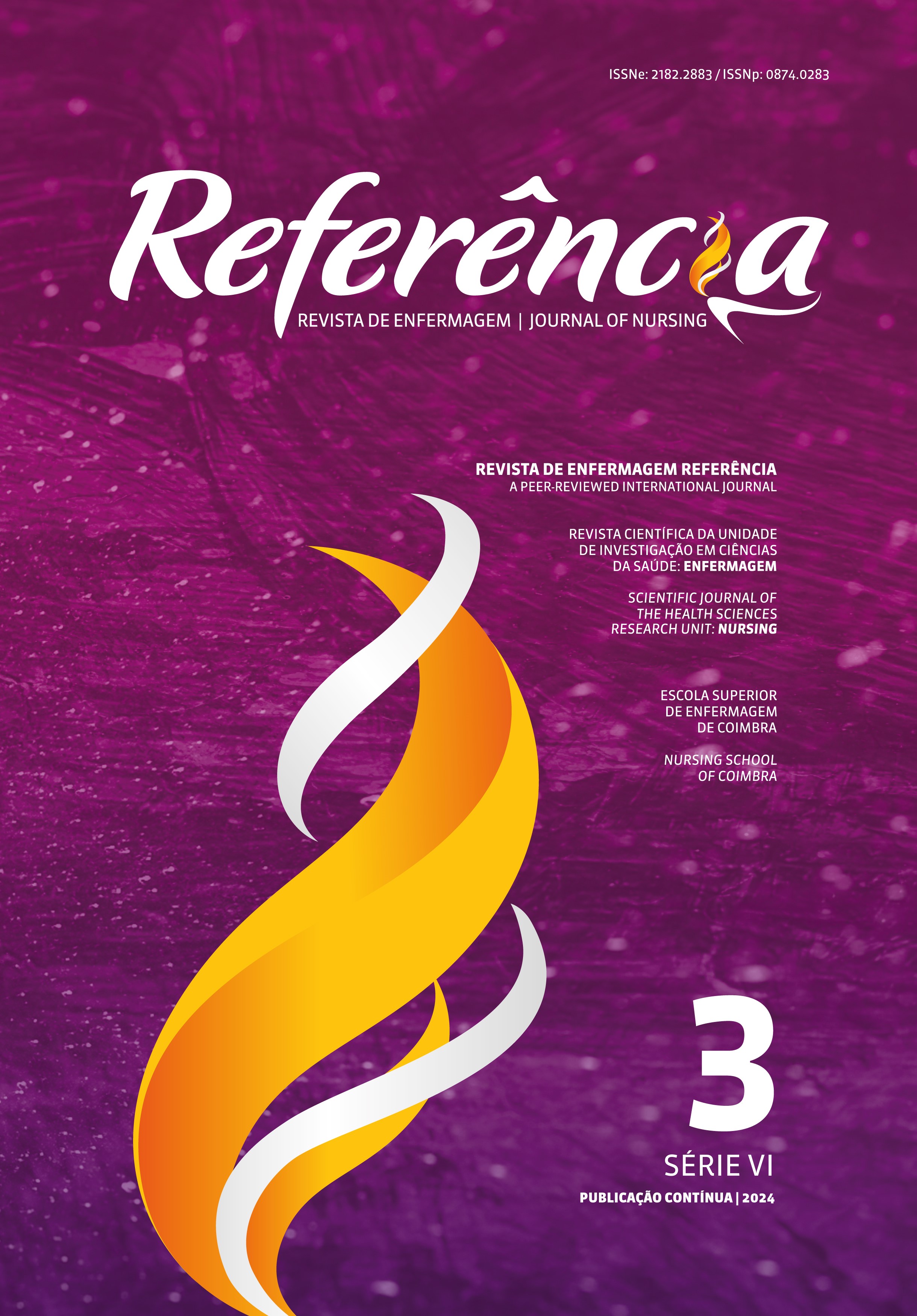Factors causing stress among nursing students in clinical practice: A scoping review
DOI:
https://doi.org/10.12707/RVI23.89.32425Keywords:
stress, factors, nursing students, clinical internship, nursing educationAbstract
Background: Nursing students report factors associated with high levels of stress in clinical practice, which are frequently experienced in this teaching-learning process.
Objective: To map the scientific evidence available on factors causing stress among nursing students in clinical practice.
Methodology: Scoping review based on the Joanna Briggs Institute methodology. The PCC (population, concept, and context) mnemonic was used. Two independent reviewers were involved in the process of selection, extraction, and analysis of articles.
Results: Seventeen studies were included. The analysis revealed factors related to personal and professional aspects, to the clinical practice environment/structure and organization, as well as to support systems, namely the supervisory model used in this process.
Conclusion: Stress-inducing factors influence the teaching-learning process of students in clinical practice. Therefore, teaching strategies should be designed to ensure the development of students’ skills during clinical practice.
Downloads
References
Aghaei, N., Babamohamadi, H., Asgari, M. R., & Dehghan-Nayeri, N. (2021). Barriers to and facilitators of nursing students’ adjustment to internship: A qualitative content analysis. Nurse Education Today, 99, 104825. https://doi.org.10.1016/j.nedt.2021.104825
Ahmadi, G., Shahriari, M., Keyvanara, M., & Kohan, S. (2018). Midwifery students’ experiences of learning clinical skills in Iran: A qualitative study. International Journal of Medical Education, 9, 64–71. https://doi.org/10.5116/ijme.5a88.0344
Ahmed, W. A., & Mohammed, B. M. (2019). Nursing students’ stress and coping strategies during clinical training in KSA. Journal of Taibah University Medical Sciences, 14(2), 116–122. https://doi.org/10.1016/j.jtumed.2019.02.002
Arias Mosquera, L. Y., Montoya Gallo, L. I., Villegas Henao, A. F., & Rodríguez-Gázquez, M. Á. (2018). Estresores en las prácticas clínicas de los estudiantes de enfermería de una universidad pública en Colombia. Investigación En Enfermería: Imagen y Desarrollo, 20(1), 105. https://doi.org/10.11144/Javeriana.ie20-1.epce
Aslan, H., & Akturk, U. (2018). Nursing education stress levels of nursing students and the associated factors. Annals of Medical of Research, 25(4), 660–666. https://doi.org/10.5455/annalsmedres.2018.06.108
Bernedo-García, M. C., Márquez-álvarez, L., Quiroga-Sánchez, E., Liébana-Presa, C., Arias-Ramos, N., & Fernández-Martínez, E. (2022). Stressor factors, emotional intelligence and engagement during clinical practice in nursing students. Index de Enfermeria, 31(3), e14065. https://discovery.ebsco.com/linkprocessor/plink?id=2c2ee9ed-8822-384a-afe4-ac13a0b79558
Bhurtun, H. D., Turunen, H., Estola, M., & Saaranen, T. (2021). Changes in stress levels and coping strategies among Finnish nursing students. Nurse Education in Practice, 50, 102958. https://doi.org/10.1016/j.nepr.2020.102958
Bodys-Cupak, I., Scislo, L., & Kózka, M. (2022). Psychosocial de terminants of stress perceived among polish nursing students during their education in clinical practice. International Journal of Environmental Research and Public Health, 19(6), 3410. https://doi.org/10.3390/ijerph19063410
Dasgupta, A., Podder, D., Paul, B., Bandyopadhyay, L., Mandal, S., Pal, A., & Mandal, M. (2020). Perceived stress and coping behavior among future nurses: A cross-sectional study in West Bengal, India. Indian Journal of Community Medicine, 45(2), 204–208. https://doi.org/10.4103/ijcm.IJCM_200_19
Gürdil Yilmaz, S., Yildiz Karadeniz, E., & Dem Lafçi, D. (2022). Clinical-practice stress levels and factors affecting these on first year nursing students. Perspectives in Psychiatric Care, 58(4), 3009–3015. https://doi.org/10.1111/ppc.13070
Leal, I., & Ribeiro, J. P. (2021). Manual de psicologia da saúde. Pactor.
Lewandowska, A., Lewandowski, T., & Laskowska, B. (2018). Education system and exposure to stress and the sense of satisfaction of nursing students. Journal of Education, Health and Sport, 8(2), 127–134. https://doi.org/10.5281/zenodo.1172148
Liu, M., Chan, Y. M., Tee, S., Gu, K., Luo, Z. M., & Wong, T. K. (2019). An iterative approach to enhance the clinical learning experience in Macao nursing education. International Journal of Nursing Sciences, 6(2), 216–220. https://doi.org/10.1016/j.ijnss.2019.01.005
Mazalová, L., Gurková, E., & Štureková, L. (2022). Changes in nursing educational stress and coping strategies: A longitudinal study in the Czech Republic. KONTAKT: Journal of Nursing and Social Sciences Related to Health and Illness, 24(3), 185–191. https://doi.org/10.32725/kont.2022.030
Peters, M. D., Godfrey, C., McInerney, P., Munn, Z., Tricco, A. C., Khalil, H. (2020). Chapter 11: Scoping reviews. In E. Aromataris & Z. Munn (Eds.), JBI manual for evidence synthesis. https://doi.org/10.46658/JBIMES-20-12
Pollock, D., Tricco, A. C., Peters, M. D., Mclnerney, P. A., Khalil, H., Godfrey, C. M., Alexander, L. A., & Munn, Z. (2022). Methodological quality, guidance, and tools in scoping reviews: A scoping review protocol. JBI Evidence Synthesis, 20(4), 1098-1105. https://doi.org.10.11124/JBIES-20-00570
Rabiais, I., & Amendoeira, J. (2013). Educar em enfermagem: Um processo de reflexividade na interação. Cadernos de Saúde, 6, 55-68. https://doi.org/10.34632/cadernosdesaude.2013.2841
Rezaei, B., Falahati, J., & Beheshtizadeh, R. (2020). Stress, stressors and related factors in clinical learning of midwifery students in Iran: A cross sectional study. BMC Medical Education, 20(1), 78. https://doi.org/10.1186/s12909-020-1970-7
Ribeiro, F. M., Mussi, F. C., Pires, C. G., Silva, R. M., Macedo, T. T., & Santos, C. A. (2020). Stress level among undergraduate nursing students related to the training phase and sociodemographic Revista Latino-Americana de Enfermagem, 28, e3209. https://doi.org/10.1590/1518-8345.3036.3209
Sequeira, C., Carvalho, J. C., Gonçalves, A., Nogueira, M. J., Lluch-Canut, T., & Roldán-Merino, J. (2020). Levels of positive mental health in Portuguese and Spanish nursing students. Journal of the American Psychiatric Nurses Association, 26(5), 483–492. https://doi.org/10.1177/1078390319851569
Serra, A. V. (2011). O stress na vida de todos os dias (3ª ed.). Gráfico de Coimbra.
Suarez-Garcia, J.-M., Maestro-Gonzalez, A., Zuazua-Rico, D., Sánchez-Zaballos, M., & Mosteiro-Diaz, M.-P. (2018). Stressors for Spanish nursing students in clinical practice. Nurse Education Today, 64, 16–20. https://doi.org/10.1016/j.nedt.2018.02.001
Vieira, M. (2017). Ser enfermeiro: Da compaixão à proficiência (3ª ed). Universidade Católica Editora.
Wielewska, M. K., Godzwon, J. M., Gargul, K., Nawrocka, E., Konopka, K., Sobczak, K., Rudnik, A., & Zdun-Ryzewska, A. (2022). Comparing students of medical and social sciences in terms of self-assessment of perceived stress, quality of life, and personal characteristics. Frontiers in Psychology, 13, 1-6. https://doi.org/10.3389/fpsyg.2022.815369
Wu, C.-S., Huang, M.-Z., & Rong, J.-R. (2021). Factors associated with perceived stress of clinical practice among associate degree nursing students in Taiwan. BMC Nursing, 20(1), 89. https://doi.org/10.1186/s12912-021-00602-6
Xiong, W., & Zhu, A. (2023). Psychological experience among internship nurses at different internship stages: A qualitative study. Nursing Open, 10(1), 328–336. https://doi.org/10.1002/nop2.1307

















